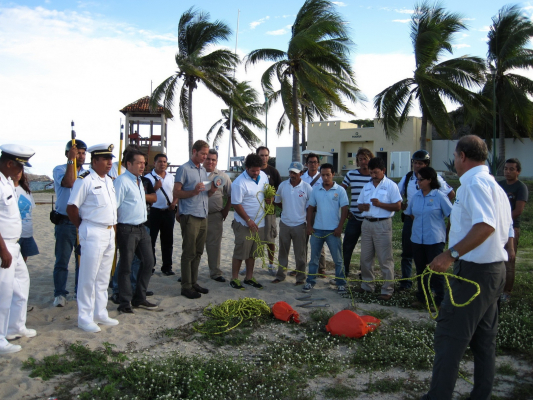Extending the global entanglement response network - Oaxaca, Mexico
The latest IWC entanglement response network training concluded successfully on September 24th in Oaxaca, Mexico. The two-day event was the most recent of several for Mexico, whose waters are the primary breeding ground for North Pacific humpback and gray whales, as well as permanent home for other species. The training was sponsored by CONANP (Comisión Nacional de Areas Naturales Protegidas) and coordinated by ECOBAC (Ecología y Conservación de Ballenas, AC) with additional support from the Center for Coastal Studies (CCS, USA). Attendees included representatives of local Fisheries and Environmental Agencies, Navy and Harbour Master, along with NGOs and boat operators nominated by CONANP.
The first day of training began in the classroom. Sessions covered local and global context, legal issues, tools, techniques and safety protocols. Led by Scott Landry, a member of the IWC expert group, and the Director of Marine Animal Rescue at CCS, the group also discussed the ultimate goal of preventing entanglements from occurring in the first place.
On the second day the theory was put into practice. Four small boats were deployed, with two used as a 'whale,' towing rope and debris to simulate entanglement, and the other boats used to conduct the 'rescue.' The rescue boat contained one instructor and two trainees at a time. There were 20 participants from Huatulco, San Agustinillo, Mazunte, Puerto Angel and Puerto Escondido. Experience and ability ranged widely but levels of commitment and enthusiasm were consistently high as trainees tested techniques on the water. Other trainees observed from the 'whale' boat. 10 additional participants observed all the manoeuvres from an “observer” boat that also played the role of the support boat.
The trainer evaluated the 20 participants. The majority and were considered capable of taking key roles in entanglement response teams. Thanks to the CONANP funds, 3 custom tool kits used during the training, as well as other necessary equipment (uniforms, buoys, rope, helmets, lifejackets and other safety gear), were provided to newly trained teams. The tool kits where distributed to teams in Huatulco, Puerto Escondido and Puerto Angel, Mazunte & San Agustinillo, as these are places where most whale watching is based, and most entangled whales have previously been reported.
This training has helped Mexico take another step forward in developing a national network of responders. The network is called RABEN (Red de Asistencia a Ballenas Enmalladas), and handles entanglements along its extensive, whale-rich coastline.
The next IWC entanglement response training will take place in La Paz, Mexico. For photographs of the Oaxaca training, and other entanglement workshops, click here.
For more information on Mexico´s Whale Entanglement Network visit www.rabenmexico.org

